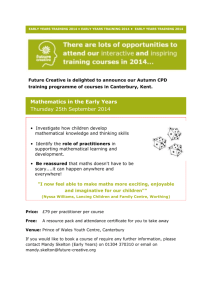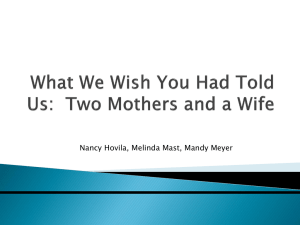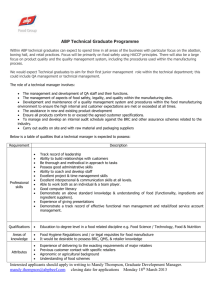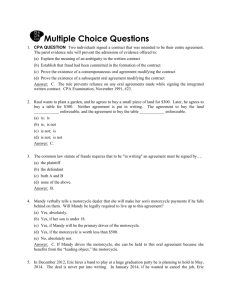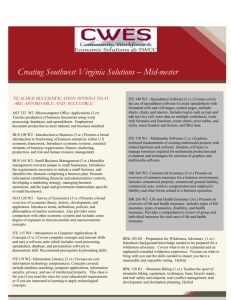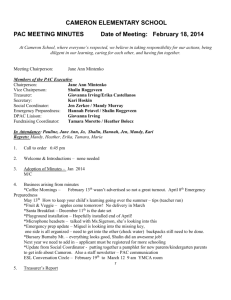Sample Student Paper with Edits - T. Denny Sanford School of
advertisement
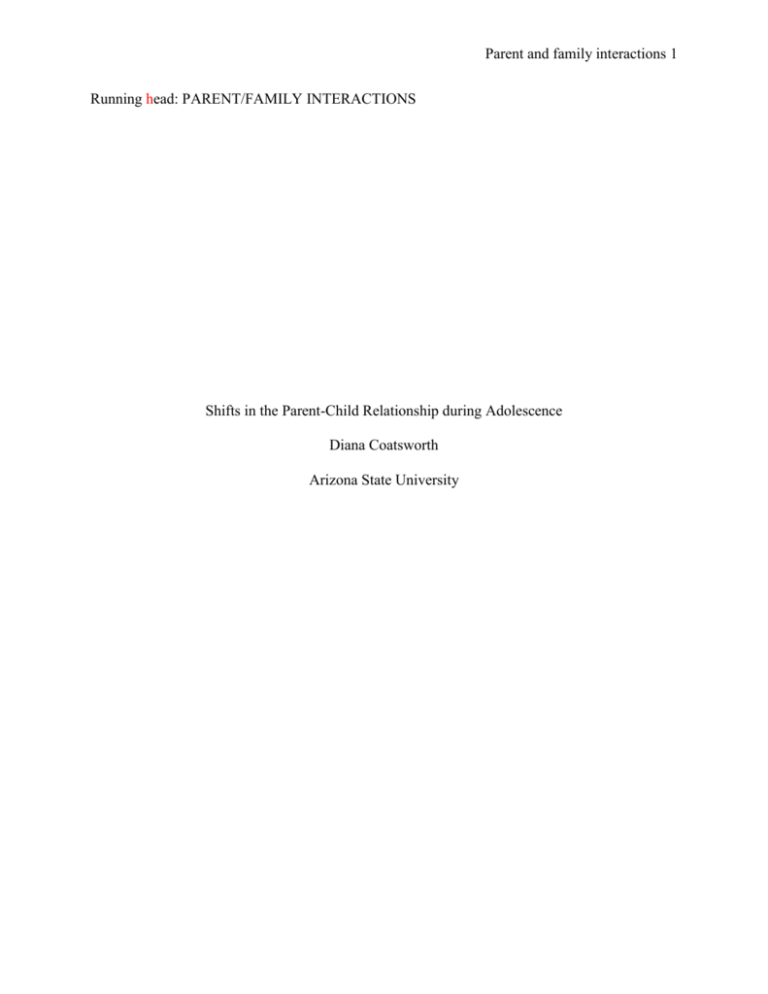
Parent and family interactions 1 Running head: PARENT/FAMILY INTERACTIONS Shifts in the Parent-Child Relationship during Adolescence Diana Coatsworth Arizona State University Parent and family interactions 2 Abstract Adolescent development undoubtedly affects the family environment and the parent-child relationship due to changes in the biological, social, cognitive changes of the adolescent, the changes parents go through at midlife and other changes in the family system. New expectations and challenges arise for the adolescent in areas such as school performance, household responsibilities, and relationship choices. In this case study one 13 year-old adolescent female and her mother are interviewed to gather their views on her development with special regard to the parent-child relationship. Reports from each person appear to converge on most issues, and the adolescent’s development is typical and healthy overall. Parent and family interactions 3 Shifts in the Parent-Child Relationship during Adolescence According to G. Stanley Hall (1904), adolescence is a time of high conflict and stress (as cited in Steinberg, 1999). However, as stated by D. Bodman, research on adolescence clearly states that this belief is a myth (Bodman, personal communication, August 23, 2000).[This information is also in your readings/text and it is better to cite that than a personal communication] Another myth is that the parent-child relationship suddenly becomes a battleground where parent and child cannot agree on anything (personal communication, August 23, 2000) [Same comment as above]. According to Laurence Steinberg (1990), adolescents and parents for the most part still agree on major issues and beliefs, and this trend continues into young adulthood. Additionally, Laurence Steinberg Ph.D. contends that indeed child and parent arguing does increase during adolescence, but it is posited that an increase in “arguing” is merely a reflection of the adolescent’s new ability to reason, think abstractly, form coherent thoughts about issues, and press their parents for good reasons for their decisions (Rutter, 1995) [hmmmmmmmm…is this Steinberg, as cited by Rutter or are you citing both Steinberg and Rutter in the same sentence? If it is the latter, put both their names/dates at the end of the sentence, separated by a semicolon]. Undoubtedly, the parent-child relationship does change as the child reaches adolescence due to biological, social, cognitive changes of the adolescent, the changes parents go through at midlife and other changes in the family system (Steinberg, 1999). Issues that possibly spark that change include school performance and achievement, the parent dyad relationship, household rules and boundaries, and friendship and relationship choices. Recently I asked an adolescent and her mother about these very issues to try to gain a better understanding about the relationship between the adolescent and her parents. Parent and family interactions 4 Mandy1 is a 13 year-old female who has one 10-year-old full-biological brother, one 23year-old half-biological brother, and one 24-year-old half-biological sister. Mandy and I met at her father’s house on a Tuesday afternoon on September 12th, 2000. No one else was present in the room at the time of the interview. Mandy chose to discuss the parent and family interaction issues in her family. We began by talking about school, her performance, and her parent’s individual attitudes about her education. Mandy reported that her father and mother both encourage her to try her best and convey to her that although good grades are important, the most important thing is that she puts an effort into school. According to Steinberg (1999), parents that who are both demanding and supportive are termed authoritative parents. It appears that Mandy has authoritative parents and that their views of education have a positive effect on her self-concept and self-esteem. Mandy stated that because of the views each of her parents, she knows that they care about her and her future. Both of Mandy’s parents are strict about her school attendance and homework completion; although, she mentioned that her mother is somewhat stricter about completing homework than her father is. Mandy seemed a little annoyed when she discussed her mother’s rules about completing homework and attending all classes. She rolled her eyes and sighed as she stressed that her mother “always makes a big deal about things that really aren’t a big deal”. She was able to discuss the possibility that her mother was a worrier and a perfectionist. She did admit, though, that her mother was able to help her with her schoolwork more than her father, but that she usually tried to complete all of her homework at school. The above reasons strongly support the idea that Mandy’s parents are acting in an authoritative way in regard to education. Studies by Bronstein et al.[always list all authors the first time they are 1 “Mandy” is a fictitious name created to protect the adolescent’s identity. Parent and family interactions 5 cited and then use et al if you cite the same group later in the paper; also, due to the number of cites here and the fact it is a secondary citing, you may just want to say “Several adolescent researchers have found that” and cite Steinberg] (1996), Dornbusch et al. (1987), and Steinberg (1994) say that authoritative parenting is a predictor of educational success in adolescence (as cited by Steinberg, 1999). Mandy’s mother, Susan2, reported that Mandy has epilepsy (Mandy did not tell me this), and that due to the epilepsy, Mandy often has difficulties learning new materials as well as maintaining attention/focus for very long segments of time. Because of these problems she receives services for speech and language, reading, writing and math through special education. Mandy’s mother is very proud of her academic performance. Her last progress report contained all A's and one B. Her mother feels that she has worked very hard to overcome her difficulties and has persevered to accomplish much more than she ever expected. She attends all Individualized Education Plan (IEP) meetings, goes to parent-teacher conferences, and volunteers on a limited basis (once or twice each year). From the above information, it appears that Mandy’s mother monitors Mandy’s performance well and is highly supportive. Both are qualities of an authoritarian [don’t you mean authoritative??] parent, according for Steinberg (1999). Next, I asked Mandy about her parent’s relationship with each other. She reported that her parents divorced when she was 6 years old and remembers being very upset and crying a lot about the divorce. As a child, she lived with her mother and visited her father on the weekends. She missed him a lot since she was not used to being without her father. She did not talk to friends about it very much when she was 6 years old, but she talks much more about it with her 2 “Susan” is a fictitious name to protect the participant’s identity. Parent and family interactions 6 close friends today. According to Steinberg (1990) adolescents develop more intimate relationships with friends than they did during childhood. Mandy has experienced some intimacy with her friends. As a way of coping with the divorce, Mandy’s parents took Mandy and her younger brother to a therapist. Mandy did not feel that the therapist really understood her feelings or what she was going through. She said that she listened more to her mother’s and father’s conflict ridden arguments than her own opinions and feelings. Overall, Mandy reported feeling pretty close to her mother and that she felt she could talk to her mom about most things, but she felt very close to her father even though she was not able to talk to him about all things. Mandy mentioned the tension and hurt feelings she used to experience when her parents argued in front of her or when her parents argued by communicating through the children. Currently, her mother is remarried and her father is dating a woman that Mandy likes and respects. She reports feeling better about the situation now that she is older and her parents seem to be happy. She said that currently her parents do not argue as much but that they do most, if not all, communication through the children or in faxed or e-mailed notes to each other. There is little or no direct communication between her parents. Mandy stated that this aspect of her parent’s relationship irritated her at times. Mandy talked openly about arguing with her parents. She and her mother do not have many actual arguments, but they do have disagreements on occasion. They are both able to express their own opinions and usually reach a compromise. Although, when her mother feels strongly about something, Mandy does not have any room to argue and accepts no for an answer. At times, if Mandy goes too far with her mother, her mother will yell at her, and she does not like that at all. If there were anything Mandy could change about her mother, she would have her not make such a big deal about things and not complicate things by making them more of a Parent and family interactions 7 problem. On the other hand, Mandy feels very negatively about her relationship with her stepfather who she feels is bossy, rude and overbearing. She mostly argues with him about chores and the television choices that he makes. She feels that he really does not care to know her or her needs. [Did you find any discussion of step parenting in your text?] Mandy said that her biological father is extremely stubborn and strict when it comes to “big things”. There is absolutely no arguing with him once he has made a decision. However, his new girlfriend is more relaxed about many things, which makes him more relaxed as well. Mandy likes the influence the girlfriend has on her father. When asked what she would change in her father, she stated that she would like him to be more understanding and not so absolute in his opinions. From Mandy’s comments, it appears that overall she has pretty good relationships with both her biological mother and father, even if she does admit difficulty with her stepfather. Mandy’s relationship with her parents seems typical of an adolescent-parent relationship when compared to Steinberg’s (1990) views. Broken rules in Mandy’s father’s house usually results in loss of privileges (radio and television privileges are used most often). Similarly, Mandy reported such losses at her mother and stepfather’s new residence. Whenever she did not complete her chores, she would be “grounded” from the television or radio. According to Bodman lecture, deprivation of privileges, a power assertive technique, is the most common type of parental behavior for adolescents (lecture, 2000). Mandy’s parents obviously subscribe to this technique. Mandy also mentioned that her father becomes extremely angry when she argues with him. He will quickly ground Mandy for a couple weeks if she talks back. Apparently, Mandy’s father has extreme coercive power over her such that she will not begin or participate in an argument against her father because she believes that he can and will provide negative experiences for her (Bodman Parent and family interactions 8 lecture, 2000). [I did not say this about Mandy’s father; you are applying your own knowledge to this situation, therefore you don’t need to cite me ] Mandy’s mother also responded to questions about Mandy’s reaction to discipline. Mandy rolls her eyes, makes comments under her breath, and at times defies her directions. Typically, Mandy and her mother establish goals together and Mandy identifies things that she would like to do or have. She then works to gain these things. When she physically fights with her younger brother, lies about her activities, or disobeys, she looses her television or C.D. player and sometimes phone privileges. Other times when she has really annoyed her mother by being moody and uncooperative, her mother yells at her. She hates it when her mother yells, but she becomes more cooperative. Mandy identified her best friend as a girl she met in school who is sad most of the time because she has had a hard life, does not have many friends and gets teased a lot at school. Mandy feels bad for her friend and often tries to cheer her up. Mandy believes that her friend basically has good values. Her friend is a very religious Catholic. Mandy is Christian and does not feel that religion matters in this friendship. Mandy’s mother approves of the friendship and knows her friend’s parents from a few interactions with them. However, Mandy’s father does not completely approve of this friendship. He believes that Mandy’s friend lacks manners and the fact that the girl was raised differently from Mandy causes him to tell her that she could find better friends elsewhere. Her father only slightly knows her friend’s parents. [What do your readings have to say about choice of friendships in adolescence?] According to Mandy’s mother, Mandy has one or two friends. Over the past three years, only one friend has been very close to her, but she recently moved away. Currently, Mandy’s mother encourages her to develop friendships with a variety of girls, which seems to be working. Parent and family interactions 9 The friend that moved away was very controlling and divisive to where Mandy did not develop other friendships. Also, prior to 2nd [second] grade she had many friends; however, after her father and mother divorced, she was diagnosed with epilepsy and placed in special education. that's when It was at this time that she began to have a lot of difficulties maintaining friendships. Her mother never feels like she has to compete with Mandy’s friends. [I would place this sentence later in the paragraph for continuity sake, i.e., perhaps the last sentence] Since Mandy has epilepsy and has had some difficulties in school, she may not have experienced normal social networks for her age. It may take more time for her to develop the social skills necessary for more intimate friendships. It appears that Mandy’s mother has been very encouraging and supportive of Mandy’s friends. [What does the text have to say about friends and parents?] According to Susan, Mandy’s mother, the most difficult aspect of being a parent of an adolescent is recognizing when to allow your child opportunities to take on more responsibility without overloading them. It is also difficult to maintain a positive relationship while continuing to enforce rules. Also as Mandy’s parent, she often finds it very difficult to deal with her irritability and mood swings. One minute she hates her mom and doesn't want to be around her mom, the next minute she wants Susan’s complete undivided attention, or wants her to do something for her like [such as] take her to the mall or movie theater. According to Steinberg (1990), certain attitudes and behaviors, like “standoffishness” and moody affect, can be predicted of insecure adolescents. Susan should expect such a wide variety of moods, actions and behaviors from Mandy, especially since she is in the very early stages of psychosocial development and may be feeling insecure often. Mandy’s development is typical and healthy in most ways. She has experienced many of the expected issues in her psychosocial development and her relationships with her mother and Parent and family interactions 10 father. Overall, Mandy gets along well with both of her parents, but she does have moments of conflict with both of them. It also appears that Mandy has adjusted well to her parents divorce and is functioning well academically given her difficulties due to epilepsy. Mandy feels comfortable in her friendships and for the most part, her parents are supportive of her social relationships. Parent and family interactions 11 References Rutter, Virginia. (1995). Adolescence: Whose hell is it?.[omit period] Psychology Today, January/February. Sussex Publishers, Inc. [omit publishing company but put page numbers of article here] Stienberg, L. & Levine, A. (1990). Enjoying your child’s teenage years. You and Your Adolescent, Harp Publishers, Inc. 108-110. [Hmmmmmmmmm…if this is a text, you would include the publisher and the place of publication but not the title, unless it is an EDITED book; if this is a journal, you would omit the publisher but include the volume number and page numbers…very confusing Also, if it is a book, you would capitalize only the first word of the title; only journal titles are all capitalized]. Stienberg, L. (1999). Adolescence (5th ed.). Boston: McGraw-Hill.
